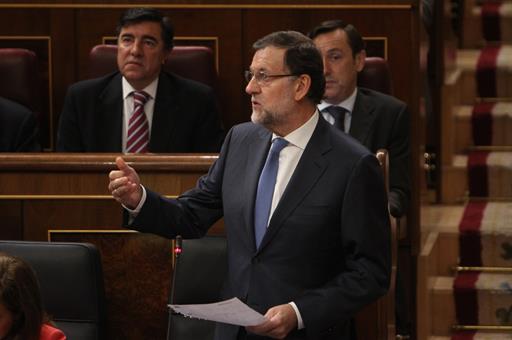"What is important is that Spain has maintained its economic sovereignty and the power to take its own decisions", says Mariano Rajoy.
President's News - 2015.6.17
Lower House of Parliament, Madrid
The member of parliament for Izquierda Plural, Cayo Lara, asked the President of the Government about the latest recommendations of the International Monetary Fund (IMF). In his answer, Mariano Rajoy explained that his economic policy has been based above all on major structural reforms (the labour reform, the Law on Budgetary Stability, the reform of the financial system, the energy reform, reform of the public administration, market unity, the Law on Entrepreneurs, the Law on the Second Opportunity), and on a fiscal consolidation plan; because there is no sense in "spending above a country's income".
The President of the Government explained that the reforms implemented "have produced results: imbalances have been corrected and competitiveness has improved in Spain". This has led to "a good rate of" economic growth and job creation. Rajoy expressed his satisfaction that there are now "more people in work, fewer unemployed and more people contributing to the Social Security system than when we came to government," despite the difficult situation in 2012 and 2013.
He explained that we have to continue to be committed to maintaining this economic policy. If we do so, "in the coming years we may see how 20 million Spanish people will be able to work." In any event, he said, "what is important is that Spain, unlike other countries where very mistaken policies were followed, has maintained its economic sovereignty and as such the power to take its own decisions."
Spain set to grow 3.1% this year, says IMF
Rosa Díez, the member of parliament for UPyD, also referred to the IMF recommendations for Spain. Rajoy answered that he agreed with some of them, but not with others. He recalled that last week the IMF referred to three things with respect to our country. First, it set the growth forecast for the Spanish economy in 2015 at 3.1%, more than double the Eurozone average and higher than the Government's own forecast (2.9%). If the forecast proves correct, "it will undoubtedly be a good result."
Second, the IMF warned that "a reversal of the economic policy and reforms that have been implemented could be a mistake; it would affect the economic growth and job creation in our country," the President of the Government said. Finally, the IMF made some recommendations and he clarified that fortunately they are only that - recommendations - and "that is what they are because Spain is a country that at a certain point in time was able to avoid a bailout."
At the same time, Mariano Rajoy gave notice of his intention to continue to cut taxes, as happened this year, 2015, with income tax and corporate tax, which has benefited 12 million taxpayers. The President of the Government has announced new tax reductions for next year in addition to those already announced, "if the level of revenues so allow it."
There is freedom of ideology and expression in Spain
The Socialist Party member of parliament Pedro Sánchez asked about the recent statement of the Managing Director of the RTVE corporation, in which he admitted he was a PP voter. In his answer, the President of the Government stressed that there is freedom of political opinion and voting and freedom of expression in Spain, so "I do not intend to take it away from anyone, whoever that person is."
In any case, Mariano Rajoy explained, "the opinions expressed by the Managing Director (of RTVE) have no effect on the independence of its reporting or of those working in Spanish television."
Mariano Rajoy also reproached the leader of the PSOE for the agreements reached by his party in some local councils and autonomous regions, given that he once said the "he would never ally with extremist parties."





